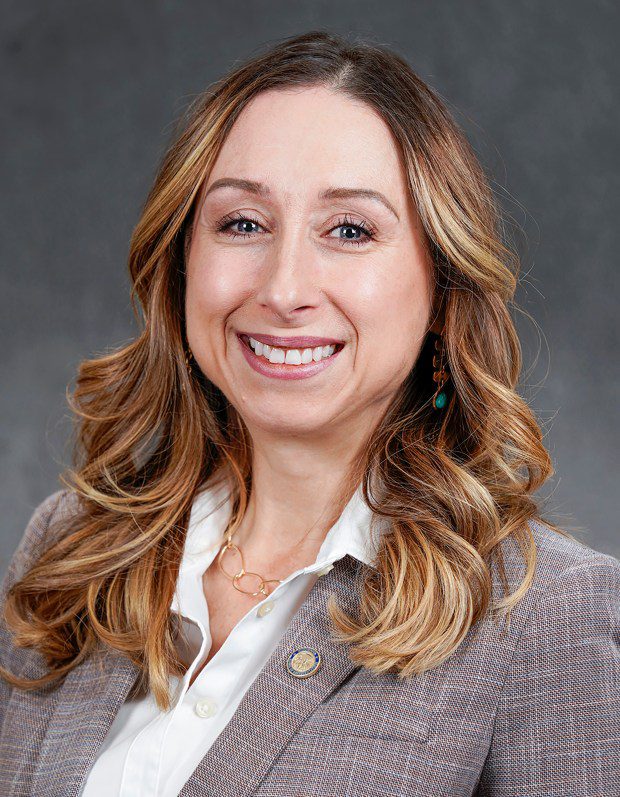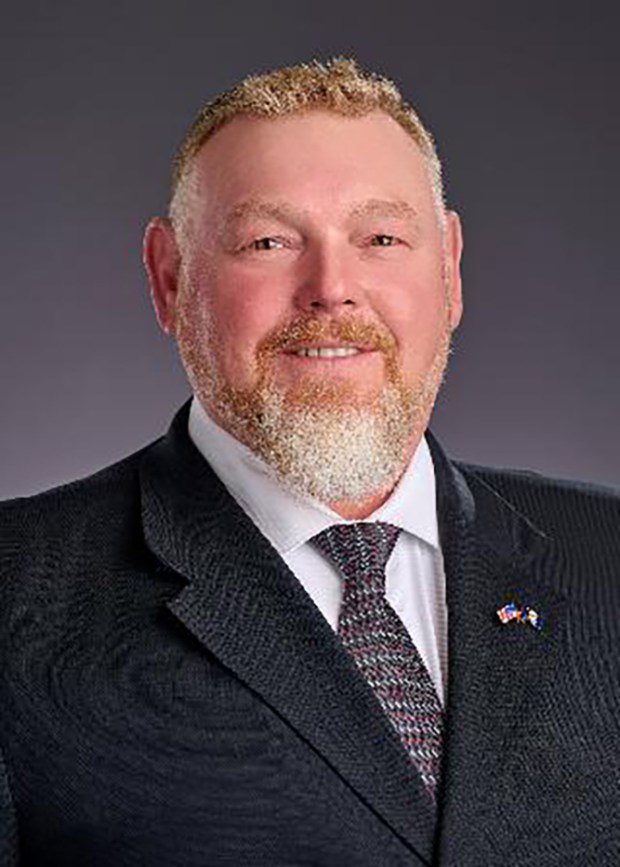Robbie Sequeira | Stateline.org (TNS)
When she became a Minnesota state legislator in 2021, state Rep. Kaela Berg, who is a single mother and flight attendant without a college degree or prior political experience, often questioned her presence at the legislative table.
She had previously run for office while dealing with housing challenges and living in a friend’s basement, and now she was making policy decisions in her home state.
While running against a former two-term Republican representative who was a commercial real estate agent, Berg was also struggling for housing and living in a friend’s basement.
Berg said, “I’m living in [her] basement, running for office, and the pandemic hits. I went from three jobs to one. … I found that while I can pay my bills, I can’t qualify for a new apartment because you have to show two or three times the rent and I can’t do that.”
Although she was grateful for the support from working families in her district, her change to a state policymaker felt like too much to handle.
Berg, a member of Minnesota’s Democratic-Farmer-Labor Party, admitted, “I had the worst case of impostor syndrome. I’m thinking, ‘Who do I think I am? I’m a working flight attendant. I don’t have a college degree. Why did I let somebody talk me into this?’”

Berg is a rare occurrence in politics: a state legislator from the working class.
Only 116 out of almost 7,400 state legislators in the United States are from working-class backgrounds, according to a study by Nicholas Carnes and Eric Hansen, political scientists at Duke University and Loyola University Chicago. This report was conducted by Nicholas Carnes and Eric Hansen, political scientists at Duke University and Loyola University Chicago. a biThe researchers conducted a study every two years. This study was conducted by Nicholas Carnes and Eric Hansen, political scientists at Duke University and Loyola University Chicago.
The researchers determined that legislators are considered “working class” if they currently or last worked in manual labor, service industry, clerical, or labor union jobs. They found that 1.6% of state lawmakers meet that definition, compared with 50% of U.S. workers. Only about 2% of Democrats and 1% of Republicans qualified as working class. Ten states — Arkansas, Louisiana, Mississippi, North Carolina, Oregon, South Carolina, Tennessee, Texas, Utah, and Virginia — have no working-class state lawmakers. The lack of working-class legislators raises concerns that economic challenges such as wage stagnation and the rising cost of living will not receive enough attention in state capitols.
Carnes said that working-class politicians are more likely to have personally faced economic hardship, so they are more interested in policies to lessen it. They often suggest solutions different from those proposed by colleagues who aren’t working class, even if it means going against party beliefs.
Carnes stated, “State legislatures make important decisions, and if you have an entire economic class of people that are not in the room when policy decisions are being made, that’s going to affect the kind of problems politicians focus on. It also shapes the kinds of solutions they consider against the interests of whoever’s out of the room.”
The number of working-class people in state legislatures has always been low, but the most recent count is even lower than it was two years ago, when the percentage was about 1.8%.
Alaska has the highest percentage of working-class lawmakers in the state legislature, with 5% — that’s three of 60 lawmakers. Maine has the highest total number of working-class legislators, eight of 151 legislators, with a transportation worker among the ranks.
transportation worker
among the ranks. Nate Roberts is a longtime electrician who won a seat in the Idaho legislature. The Democrat is among the small number of working-class lawmakers around the country. (Idaho Legislature/TNS) and a bartender Working-class issues

first-time Idaho lawmakers entering
Roberts knew that it wasn’t just his relative political inexperience that separated him from the rest of his colleagues. He also was one of the only state lawmakers who had worked a union job. And during his first few weeks in office, he was shocked by how rarely issues such as wage theft, low pay and housing affordability had been talked about in committee meetings. office in 2023.
“That’s when I realized that the only person that’s going to advocate for working-class people is a working-class person,” he told Stateline. “When I moved from state to state working different jobs, I realized how differently states were influenced when it came to policies for working people.”
Roberts learned the power of unions as a journeyman — and fighting to increase worker protections has become his life, he said.
Idaho is one of 26 so-called right-to-work states, where no person can be forced, as a condition of employment, to join a union. Such laws limit unions’ bargaining power.
Roberts would like Idaho to follow the lead of Michigan, which in 2023 became the first state in decades to pass a right-to-work law. That is unlikely in Idaho, given the state’s conservative political orientation. But Roberts also is pushing to update Idaho’s child labor laws, which were enacted in 1907 and have been superseded by the federal Fair Labor Standards Act of 1938.
became the first state
in decades to enact a right-to-work law. a right-to-work law. That is unlikely in Idaho, given the state’s conservative political orientation. But Roberts also is pushing to update Idaho’s child labor laws, which were enacted in 1907 and have been superseded by the federal Fair Labor Standards Act of 1938. Roberts said his experience as a laborer in his younger years has emboldened him to speak out against legislation such as a Senate that would repeal limits on the number of hours and how late in the day a child under the age of 16 can work. repeal that would repeal limits on the number of hours and how late in the day a child under the age of 16 can work.
“I’m still shocked when I get pushback for going against these bills, particularly ones that I feel regress our child labor laws,” said Roberts. “I’ve experienced it. We need to not only protect our kids, but we also need to protect our workers.” bill The political climate is far different in Minnesota, where the Democratic-Farmer-Labor Party has controlled the governor’s office, the state House and the state Senate since January 2023. Last year, the state enacted a major package of labor-friendly laws.
major package of labor-friendly laws
Minnesota also passed a slew of tenant-landlord laws, with protections favoring the state’s renters. protections favoring the state’s renters.
Berg said the backgrounds of working-class legislators like herself can inform statehouse conversations, even if lawmakers with different backgrounds support pro-labor policies. Berg thinks it's not very valuable to have people with personal experience in the legislature. She believes that people who still struggle to make ends meet bring their personal experience to fight for bills that would help working families..
For Wisconsin state Rep. Jenna Jacobson, starting in the legislature in 2023 felt overwhelming, she said.
One of her main goals is to increase assistance for
free school meals
— influenced by her own experience as a student. Jacobson, a Democrat, said, "I used to be one of the kids who received free and reduced lunches. I know many kids in similar situations."There are many obstacles
For working-class Americans, financial and societal barriers make it difficult to pursue state offices, said Amanda Litman, co-founder of Run for Something, a group that recruits candidates for local elections.
A nationwide study by Tufts University
found that local candidates who grew up in poverty felt particularly restricted.
A 2021 Litman said, “It's really hard for people who aren't already wealthy or have rich partners or families to get into politics. State gatekeepers typically pick candidates who can raise money independently.” The qualifications for statewide office
vary widely by state
. Only five states — Arizona, Connecticut, Hawaii, Maine and Minnesota — offer public financing choicesfor candidates running for state legislative seats. Becoming comfortable wielding political power as a working-class person takes time, according to Indiana Republican state Rep. Peggy Mayfield. Mayfield, who used to be a secretary at her husband's insurance company, is now a 12-year veteran in the legislature who knows how to navigate state politics and pass bills.
But running for office, let alone holding state office, is time-consuming and requires sacrifices, she said.
Mayfield said, "If an employee came to me and said, 'I want to run for office,' I'd have to decide whether to let them have four months off a year or make a tough choice. Running for office itself becomes a full-time job, and for some working-class individuals, it may not be logical to go into politics if they can find more profitable opportunities in the private sector."
Some states have raised legislative pay to attract more working-class people to run for elective office.
Kansas
increased salaries
for rank-and-file lawmakers from about $29,000 to $57,000 after some said the lower pay wasn't enough to live on. are among the states with measures this session that could increase lawmakers’ pay. New York made a law in 2022 that made Arizona, Kentucky, New Jersey and Vermont lawmakers the highest
paid in the country its Pennsylvania has adjustments for the cost of living.. Roberts, the electrician who became a lawmaker in Idaho, said: “We don’t do this for the money, and some of us definitely aren't getting wealthy from this job. Some of us are managing to make enough to cover our expenses. “But we have residents who are also managing to make enough to cover their expenses, and they depend on us to speak on the issues affecting them, and that’s what keeps you going,” Roberts added.
Lawmakers in Idaho earn $19,927, following a salary increase
that was approved in 2022
Another challenge for people who want to be working-class lawmakers, Carnes said, is running a viable campaign against more established political candidates. The working class needs infrastructure and coalition-building to compete politically, he said, similar to women candidates who receive support from EMILY’s List (a pro-abortion rights group). “The solution is pretty simple,” said Carnes. “If you commit to working-class people and collaborate with labor unions and political parties to recruit and train working-class people to run for office — it’s possible you will see more working-class state legislators.”.
In Minnesota, Rep. Berg soon realized that her best legislative asset was her ability to vouch for the working experiences of everyday Minnesotans.
A flight attendant for Endeavor Air, Berg has signed on to a
that, among other provisions, would eliminate the exception for air flight crews in the state’s law on employee sick time. Her experience enabled her to confidently explain to legislative peers how the exemption had negatively impacted flight crews.
“Government works best when all types of personal experience are at the legislative table,” Berg said. “I knew that I was uniquely able to speak on issues that my other colleagues never experienced.” bill ©2024 States Newsroom. Visit at
stateline.org
. Distributed by Tribune Content Agency, LLC. Just 116 of the nearly 7,400 state legislators in the United States come from working-class backgrounds, according to a study.. Distributed by Tribune Content Agency, LLC.









